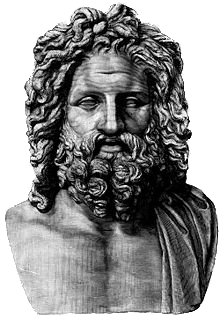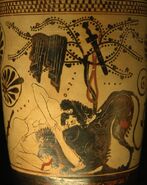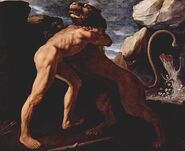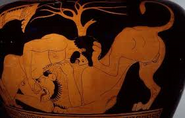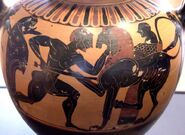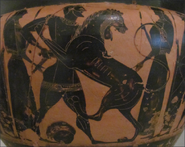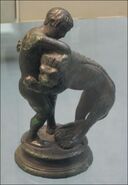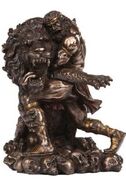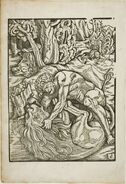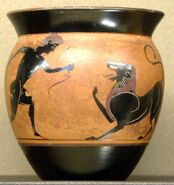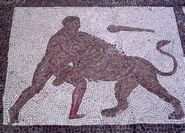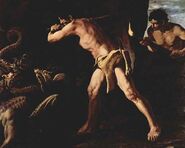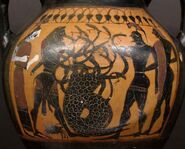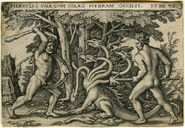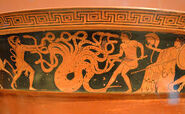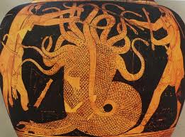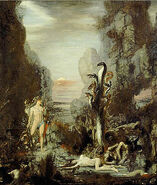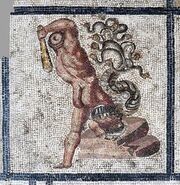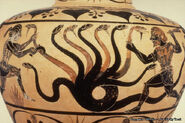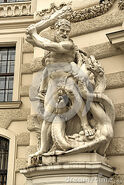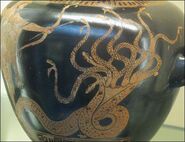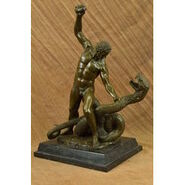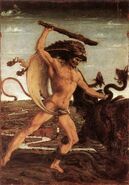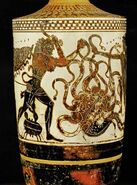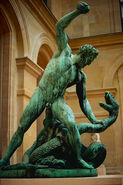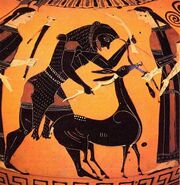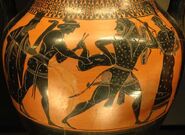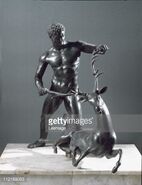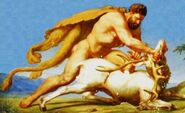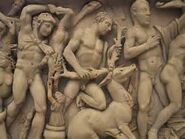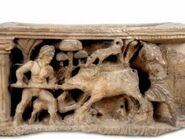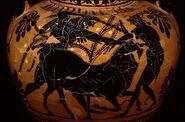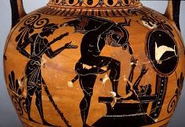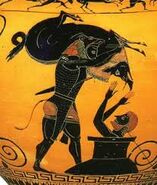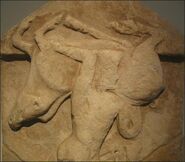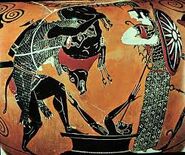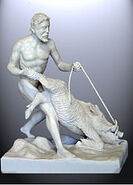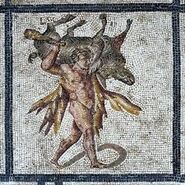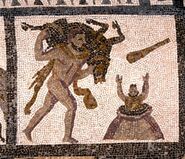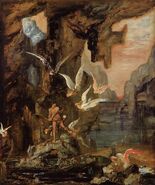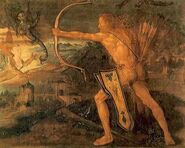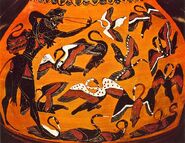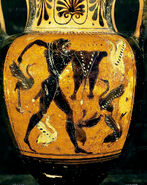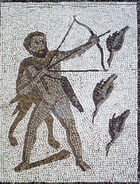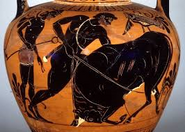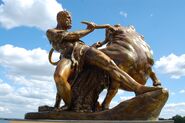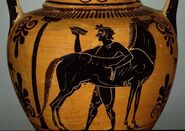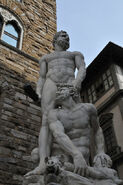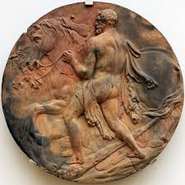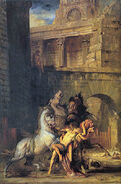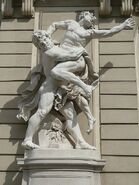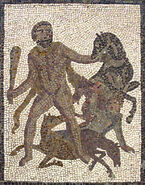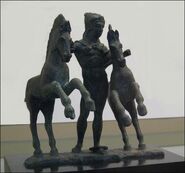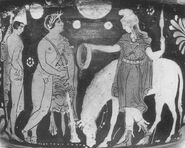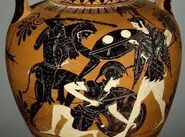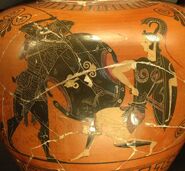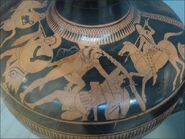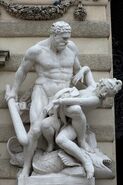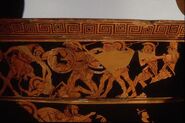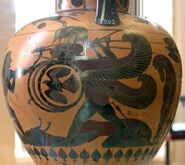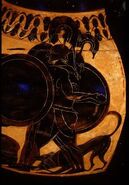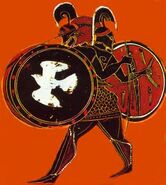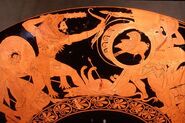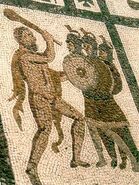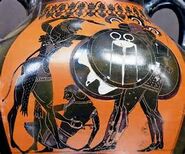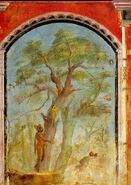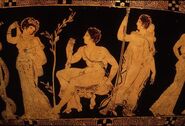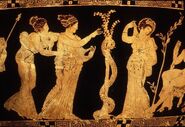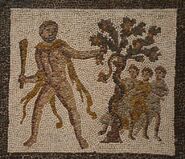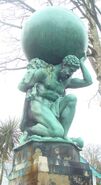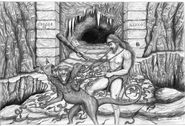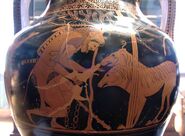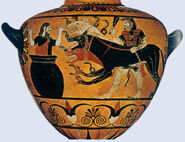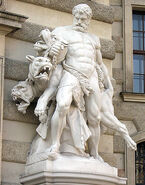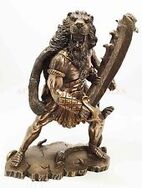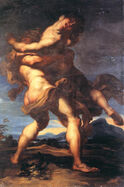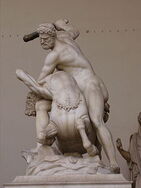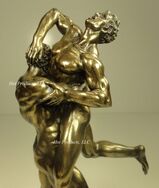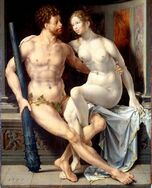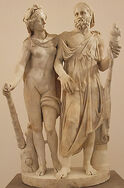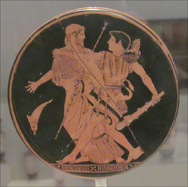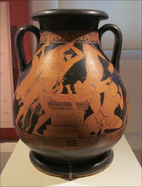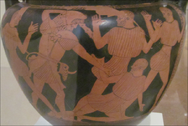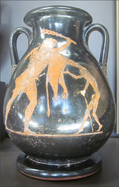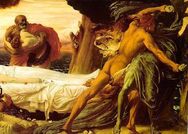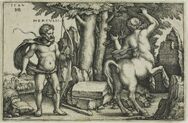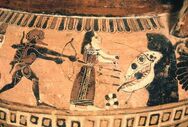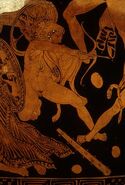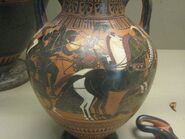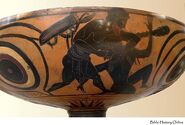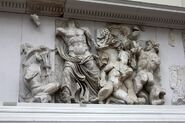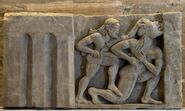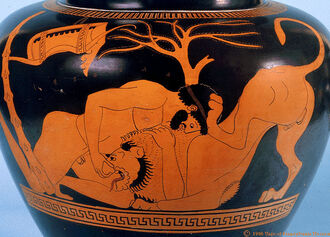
Herakles, better spelled as Heracles is the proper spelling for the Greek God Heracles. The reason for the two spellings is that the Ancient Greeks did not have the letter C for any word. The equivalent in most cases was the letter 'K' (kappa). Eventually this would change but some of the Ancient Greek fundamentalists spell it with a 'K'.
His Roman counterpart is Hercules.
Personality[]
Herakles was considered the greatest of heroes, however his intelligence was limited to waging war, and killing beasts and monsters. Herakles relied on his strength and knowledge of weapons to defeat his enemies, rather than cunning such as Theseus, and in a later generation, Odysseus. There was only one occasion where Herakles managed to successfully use trickery on an enemy and that was merely because his enemy was Atlas, the second least intelligent Titan (the least being Epimetheus).
While Herakles was very loyal to friends, he did not forget nor forgive insults or broken promises made to him, such as when Augeas refused to pay Herakles for cleaning his stables. After the labors Herakles waged war against him.
Herakles was also harder on himself than anyone else when he made mistakes. For example, when he killed his first wife and their children due to madness brought on by Hera, his friends and the community and general recognized his actions were not his fault and he was not to blame. Herakles however thought different and became intent on performing some sort of penance. This brought about the Twelve Labors of Herakles.
Mythology[]
Childhood[]
Herakles, who was born Alkaeus, was not a normal child, even as a baby. One day, he and his brother, Iphicles, were put to sleep, Hera sent two poisonous snakes to kill Herakles (though there is a less accepted theory that his step-father Amphitryon sent them in order to find out which if either was his son). That evening the snakes came into the room where Iphicles and Herakles slept. Alcmene was awakened by screams from the children's the room. Alcmene woke Amphitryon who promptly grabbed his sword and shield. Amphitryon and Alkemene rushed in and found Iphicles cowering in the corner crying while Herakles was gleefully shaking the dead, limp bodies of the snakes which Herakles had managed to strangle to death in the time that it had taken Amphitryon to grab a sword and shield and rush to the nursery.
Adolescence[]
In his youth Herakles had already made a name for himself. At some point Herakles found himself in Thespiae an ancient Greek city (Polis) in Boeotia hunting a lion (not the Nemean Lion). At the time Thespiae was ruled by King Thespius (the land's founder) and Queen Megamede. When Thespius learned of Herakles' presence he saw a way to take advantage of it.
The king and queen had fifty daughters (it is likely many of them were daughters of Thespias and mistresses) all of whom were of marrying age but not married. Thespius came up with the idea of having all of his daughters become pregnant by Herakles.
Thespius extended his hospitality to the great hero and invited him to stay at the palace while Herakles was hunting down the lion. Thespius said for the time that Herakles was there "you may have my eldest daughter Prokris as your bedfellow."
Each night Thespius sent a different one of his daughters (dressed similar to how Prokris had on the first night) to be impregnated by Herakles. The combination of being tired from the hunt and each evening's dinner meant Herakles was not able to realize he was with a different daughter. By the time Herakles finally hunted down and killed the lion and was ready to leave he had slept with forty-nine of the fifty daughters (one of them did not like her father's plan) and the daughters bore a total of fifty-one sons (the eldest Prokris and the youngest of the daughters both bearing twins).
First Marriage[]
Since birth, Heracles was hunted by Hera's fury. Her revenge came to a climax after Heracles' marriage. One day, Hera made Heracles go into a blind frenzy, inflicting chaos on all those around him. But those people were his wife and children. After recovering from the rage, he was shocked to find his family dead at his feet. The people around could not bear the knowledge of Heracles act and told him. Crying for his loved ones, and calling himself a murderer, Theseus, king of Athens, came forth from the crowd, offered the demigod his hand and told him to come with him to Athens. At first, Heracles refused to touch the hand, since according to the Greek belief, a man who touches the blood of a murdered one is also responsible for the act. After Theseus insisted, Heracles agreed. At Athens, Heracles sought out the Oracle, which told Heracles that if he wished to be pure again, he must punish himself. Heracles left and turned to his uncle, Eurystheus, who was a cruel, insidious man. Eurystheus took the offer and gave Heracles what was later known as the Twelve Labors of Herakles.
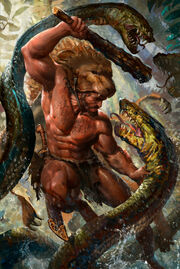
Time as an Argonaut[]
Some time after completing his twelve labors Herakles took part in another famous adventure, the Quest for the Golden Fleece.
Trojan Sea Monster[]
The Argonauts had gotten caught in a storm
“They [the Argonauts] encountered a storm and were carried to Sigeion in the Troad. When they disembarked there, it is said, they discovered a maiden bound in chains upon the shore, the reason for it being as follows. Poseidon, as the story runs, became angry with Laomedon the king of Troy in connection with the building of its walls, according to the mythical story, and sent forth a Ketos (Sea-Monster) to ravage the land. By this monster those who made their living by the seashore and the farmers who tilled the land contiguous to the sea were being surprised and carried off. Furthermore, a pestilence fell upon the people and a total destruction of their crops, so that all the inhabitants were at their wits end because of the magnitude of what had befallen them. Consequently the common crowd gathered together into an assembly and sought for a deliverance from their misfortunes, and the king, it is said, dispatched a mission to Apollon to inquire of the god regarding what had befallen them. When the oracle, then, became known, which told that the cause was the anger of Poseidon and that only then would it cease when the Trojans should of their free will select by lot one of their children and deliver him to the monster for his food, although all the children submitted to the lot, it fell upon the king’s daughter Hesione. Consequently, Laomedon was constrained by necessity to deliver the maiden and to leave her, bound in chains, upon the shore. Here Herakles, when he had disembarked with the Argonauts and learned from the girl of her sudden change of fortune, rent asunder the chains which were about her body and going up to the city made an offer to the king to slay the Ketos. When Laomedon accepted the proposal and promised to give him as a reward his invincible mares, Herakles they say, did slay the Ketos and Hesione given the choice either to leave her home with her saviour or to remain in her native land with her parents. The girl, then chose to spend her life with the stranger, not merely because she preferred the benefaction that she had received to the ties of kinship, but also because she feared that a Ketos might again appear and she be exposed by the citizens to the same fate as that from which she had just escaped.”
Departure From the Argonauts[]
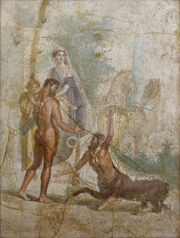
His time however as an Argonaut was brief, the Argonauts decided to have a competition to see who could row for the longest period of time before exhaustion set in. The last two were Jason and Herakles and finally Jason became exhausted but moments later Herakles' oar broke.
So that Herakles could get wood for a new oar the Argonauts stopped at the island Mysia. Herakles set out to find a sturdy which Herakles could make his oar while his and his close companion Hylas went to get water. The nymph or nymphs (Pegaiai Naiades) of the local spring (Dryope in particular), fell in love with Hylas and kidnapped him thus Hylas vanished without a trace.
When Herakles noticed Hylas had disappeared he along with Polyphemus searched the island for a great length of time. The two spent so much time that under great pressure from most of the crew that Jason decided they had waited long enough for Herakles and Polyphemus. So, the crew of the Argo left without them bringing an end to Herakles' brief time as an Argonaut.
Twelve Labors[]
The First Labor: Slay the Nemean Lion[]
The Nemean Lion known as Leon Nemeios (Λεον Νεμειος), was the son of the monster Ekhidna, it dwelled in Nemea, north of Argus. The lion was said to be bigger than Heracles, could not be harmed by any weapon. He used to emerge from two openings in his cave and destroy anything and anyone who stood in his way, and terrorized the nearby valleys. As a first task, Aristeaus told Herakles to bring him the skin of the Nemean Lion.
Herakles climbed the mountain, passed the bushes and at twilight he found the lion. Herakles took his bow and shot the lion. Since no weapons could harm it, the arrow fell to the ground as the lion did not even notice it. Heracles shot an arrow to the monster's chest, but of no avail. But that last arrow fell between the Lion's feet and he noticed Herakles, and jumped toward him. The demigod tried to hit its head with an olive wood branch, but it only misted the Lion's eyes and it retreated back to its lair.
Herakles used his enemy's blindness, and blocked the rear entrance of the cave, and stormed through the front, there he found the lion. The hero jumped on the beast's back, and since he could not harm it with weapons, he suffocated it to death. Using the dead Lion's own claws, he opened its body and made a mantal from the skin. He wore it ever since.
Returning with the pelt to the capital city, his uncle was so afraid of Herakles' mighty power he ordered him to never enter the capital with the evidence of his labors, and gave his nephew tasks using a messenger.
The Second Labor: Slay the Lernean Hydra[]
The Lernaean Hydra (Λερναιαν Ὑδρα), yet another child of Ekhidna, was a terrifying beast, which lived near Amimona river, and bathed in the deep swamps nearby. It had nine heads of a serpent and a body of a dog. With its deadly venomous spit, it killed animals and destroyed crops. Heracles was told to slay the Hydra, and came to her home by a chariot driven by Iolaus, his nephew. The demigod fired burning arrows into its lair to call the Hyra out, but to his surprise, both the Hydra and another beast came out. It was a giant crab sent by Hera, so Heracles may find his death. Coming out of the mud, the crab bit Heracles' leg, trying to make him fall. Heracles crushed the crab with his heel, but was trapped by the Hyra. Herakles tried to behead the Hydra, but whenever a head was cut off, two others grew instead. Seeing Heracles failing to cut off the Hydra's heads, Iolaus burned a branch of a nearby tree, and whenever a head was chopped, he burned it so another may not grow. At the end, only one head remained, but it was immortal, so Heracles took a rock and buried the head underneath. Returning to the city, Aristaeus claimed since Herakles had Iolaus as an assistance, it was not to be considered a task.
The Third Labor: Capture the Golden Hind of Artemis[]
Eurystheus and Hera were greatly angered to find that Heracles had managed to escape from the claws of the Nemean Lion and the fangs of the Lernaean Hydra, and so decided to spend more time thinking up a third task that would spell doom for the hero. The third task did not involve killing a beast, as it had already been established that Heracles could overcome even the most fearsome opponents, so Eurystheus decided to make him capture the Kerynitis Hind, as it was so fast it could outrun an arrow.
After beginning the search, Heracles awoke from sleeping and he could see the hind from the glint on its antlers. Heracles then chased the hind on foot for a full year through Greece, Thrace, Istria and the land of the Hyperboreans. In some versions, he captured the hind while it slept, rendering it lame with a trap net. In other versions, he encountered Artemis in her temple and she told him to leave the hind and tell Eurystheus all that had happened and his third labor would be considered to be completed. Yet another version claims that Herakles trapped the Hind with an arrow between the forelegs of the creature.
Eurystheus had given Heracles this task hoping to incite Artemis' anger at Heracles for his desecration of her sacred animal. As he was returning with the hind, Heracles encountered Artemis and her brother Apollo. He begged the goddess for forgiveness, explaining that he had to catch it as part of his penance, but he promised to return it. Artemis forgave him, foiling Eurystheus' plan to have her punish him.
Upon bringing the hind to Eurystheus, he was told that it was to become part of the King's menagerie. Heracles knew that he had to return the hind as he had promised, so he agreed to hand it over on the condition that Eurystheus himself come out and take it from him. The King came out, but the moment Heracles let the hind go, it sprinted back to its mistress, and Heracles left saying that Eurystheus had not been quick enough. Eurystheus, upset that Heracles had managed to overcome yet another creature, told him to bring the fearsome Erymanthian Boar back to him alive.
The Fourth Labor: Capture the Erymanthian Boar[]
For Herakles' fourth labor, he was charged to capture the Erymanthian Boar, an enormous boar that had been a giant fear-inspiring creature of the wilds that lived on Mount Erymanthos. The Erymanthian Boar that attacked the farmlands of Psophis.
Hercules' fourth labour—by some counts, for there is no single definitive telling—was to capture the Ermanthian Boar. On the way there, Herakles visited Pholus ("caveman"), a kind and hospitable centaur and old friend. Hercules ate with him in his cavern—though the centaur devoured his meat raw—and asked for wine. Pholus had only one jar of wine, a gift from Dionysoss to all the centaurs on Mt. Erymanthos. Heracles convinced him to open it, and the smell attracted the other centaurs. They did not understand that wine needs to be tempered with water, became drunk, and attacked. Herakles shot at them with his poisonous arrows, and the centaurs retreated all the way to Khiron's cave.
Pholus was curious why the arrows caused so much death, and picked one up but dropped it, and the arrow stabbed his foot, poisoning him. One version states that a stray arrow hit Khiron as well, but Khiron was immortal, although he still felt the pain. Khiron's pain was so great, he volunteered to give up his immortality, and take the place of Prometheus, who had been chained in to the top of a mountain to have his liver eaten daily by an eagle, although he was an immortal Titan. Prometheus' torturer, the eagle, continued its torture on Khiron, so Heracles shot it dead with an arrow. It is generally accepted that the tale was meant to show Heracles as being the recipient of Khiron's surrendered immortality. However, this tale contradicts the fact that Khiron later taught Akhilles. The tale of the Kentaurs sometimes appears in other parts of the twelve labours, as does the freeing of Prometheus.
Heracles had visited Khiron to gain advice on how to catch the boar, and Chiron had told him to drive it into thick snow, which sets this Labour in mid-winter. Having successfully caught the Boar, Heracles bound it and carried it back to Eurystheus, who was frightened of it and ducked down in his half-buried storage pithos, begging Heracles to get rid of the beast, a favorite subject for the vase-painters. Heracles obliged. Roger Lancelyn Green states in his Tales of the Greek Heroes that Heracles threw it in the sea. It then swam to Italy, where its tusks were preserved in the Temple of Apollo at Cumae. Three days later, Eurystheus, still trembling with fear, sent Heracles to clean the Augean stables.
The Fifth Labor: Clean the Augean Stables[]
The fifth Labour of Heracles was to clean the Augean Stables. This assignment was intended to be both humiliating (rather than impressive, as had the previous labours) and impossible, since the livestock were divinely healthy (immortal) and therefore produced an enormous quantity of dung. These stables had not been cleaned in over 30 years, and over 1,000 cattle lived there. However, Heracles succeeded by rerouting the rivers Alpheus and Peneus to wash out the filth.
Augeas was irate because he had promised Heracles one tenth of his cattle if the job was finished in one day. He refused to honour the agreement, and Herakles killed him after completing the tasks. Heracles gave his kingdom to Augeas' son Phyleus, who had been exiled for supporting Heracles against his father.
The Sixth Labor: Rid the Island Stymphalos of the Man-eating Birds[]
For his sixth labor, Herakles had to get rid of the Man-Eating Stymphalian Birds. Herakles traveled to the island of Stymphalos. Heracles could not go too far into the swamp, for it would not support his weight. Athena, noticing the hero's plight, gave Heracles a set of castanets which had made especially for the occasion. Heracles shook the Castanets and frightened the birds into the air (other versions of the story say that Herakles was given a pair of symbols which he banged loudly). Heracles then shot many of them with his arrows. The rest flew far away, never to return. The Argonauts would later encounter them. Heracles then brought some of the birds he had killed to Eurystheus. He then sent Heracles to capture the Cretan Bull and bring it to him. In order to get them out of the trees Herakles first started banging cymbols.
The Seventh Labor: Capture the Kretan Bull[]
Whistling merrily at his success so far, Heracles was then sent to capture the bull by Eurystheus as his seventh task. He sailed to Krete, whereupon the King, Minos, gave Heracles permission to take the Kretan Bull away and offered him assistance, which Heracles denied because of pride, as it had been wreaking havoc on Krete by uprooting crops and leveling orchard walls. Heracles snuck up behind the bull and then used his hands to strangle it, and then shipped it back to Athens. Eurystheus, who hid in his pithos at first sight of the creature, wanted to sacrifice the bull to Hera, who hated Heracles. She refused the sacrifice because it reflected glory on Heracles. The bull was released and wandered into Marathon, becoming known as the Marathonian Bull. Theseus would later sacrifice the bull to Athena and/or Apollo.
The Eighth Labor: Steal the Men Eating Mares of Diomedes[]
After capturing the Kretan bull, Herakles was to steal the Mares of Diomedes. In one version of the story, Heracles brought a number of youths to help him. They took the mares and were chased by Diomedes and his men.
Herakles was not aware that the horses, called Podagros (the fast), Lampon (the shining), Xanthos (the blond) and Deinos (the terrible), were kept tethered to a bronze manger because they were wild; their madness being attributed to an unnatural diet of human flesh. Some versions say that they expelled fire when they breathed. They were man-eating and uncontrollable, and Herakles left his favoured companion, Abderus, in charge of them while he fought Diomedes, and found out that the boy was eaten. In revenge, Herakles fed Diomedes to his own horses, then founded Abdera next to the boy's tomb.
In another version, Herakles stayed awake so that he didn't have his throat cut by Diomedes in the night, and cut the chains binding the horses. Having scared the horses onto the high ground of a peninsula, Heracles quickly dug a trench through the peninsula, filling it with water, thus making it an island. When Diomedes arrived, Heracles killed him with an axe (the one used to dig the trench), and fed the body to the horses to calm them.
Both versions have eating make the horses calmer, and Herakles took the opportunity to bind their mouths shut, and easily took them back to King Eurystheus, who dedicated the horses to Hera. In some versions, they were allowed to roam freely around Argos, having become permanently calm, but in others, Eurystheus ordered the horses taken to Olympus to be sacrificed to Zeus, but Zeus refused them, and sent wolves, lions, and bears to kill them. Roger Lancelyn Green states in his Tales of the Greek Heroes that their descendants were used in the Trojan War. After the incident, Eurystheus sent Herakles to bring back the Girdle of Hippolyta.
The Ninth Labor: Obtain the Girdle of Hippolyta, Queen of the Amazons[]
Hippolyta appears in the myth of Heracles.He was sent to obtain the Girdle of Hippolyta It was her girdle that Heracles was sent to retrieve for Admeta, the daughter of king Eurystheus, as his ninth labor. When Heracles landed the Amazons originally were reserved and did not received him warmly. However Herakles performed a feet of great strength and won them over. Upon hearing his request, she agreed to let him take the girdle. Hera, however, was not pleased, as was often the case with Heracles. The fact that Herakles won the Amazons over so easily and thus acquired the Girdle with ease, Hera was upset. Hera took action to stop him, she came down to the Amazons disguised as one of their own and ran through the land, crying that Heracles meant to kidnap their queen. Probably remembering all too well what Theseus had done. Several of the Amazons including Aella, Alkippe, Antiope and Moldapia charged toward the ship to save Hippolyta. Fearing that Hippolyta had betrayed him, Heracles kissed her briefly then hastily killed her, Herakles ripped the girdle from her lifeless body, and set sail, narrowly escaping the raging warriors.
The Tenth Labor: Obtain the Cattle of the Giant Geryon[]
The tenth labour was to obtain the Cattle of Geryon. In the fullest account in the Bibliotheca of Apollodorus, Herakles had to go to the island of Erytheia in the far west (sometimes identified with the Hesperides), or with the island which forms the city of Cádiz, Spain to get the Cattle. On the way there, he crossed the Libyan dessert and became so frustrated at the heat that he shot an arrow at the sun god Helios who "in admiration of his courage" gave Hercules the golden chariot Helios used to sail across the sea from west to east each night. Hercules rode the chariot to Erytheia; Hercules in the chariot was a favorite motif on black-figure pottery. Such a magical conveyance undercuts any literal geography for Erytheia, the "red island" of the sunset. When Hercules landed at Erytheia, he was confronted by the two-headed dog Orthrus. With one blow from his olive-wood club, Hercules killed Orthrus. Eurytion the herdsman came to assist Orthrus, but Hercules dealt with him the same way.
On hearing the commotion, Geryon sprang into action, carrying three shields and three spears, and wearing three helmets. He attacked Hercules at the River Anthemus, but was slain by one of Hercules' poisoned arrows. Hercules shot so forcefully that the arrow pierced Geryon's forehead, "and Geryon bent his neck over to one side, like a poppy that spoils its delicate shapes, shedding its petals all at once." Hercules then had to herd the Cattle back to Eurystheus.
While Appollodorus does not include this in his version of the narative, while driving the herd over the Aventine Hill the giant Kakus, who lived there, stole some of the Cattle as Hercules slept. In a manner similar to Hermes theft of Cattle Kakus made the Cattle walk backwards so that they left no trail. According to some versions, Hercules drove his remaining cattle past the cave, where Kakus had hidden the stolen animals, and they began calling out to each other. In other versions, however it is generally accepted that it was Kakus' own sister Kaka who told Hercules where Kakus and the cattle were. Hercules then killed Cacus, and set up an altar on the spot.
A couple of other details generally overlooked are that to annoy Hercules, Hera sent a to bite the cattle, irritate them, and scatter them. Hercules within a year retrieved them. Hera then sent a flood which raised the level of a river so much, Hercules could not cross with the cattle. He piled stones into the river to make the water shallower. When he finally reached the court of Eurystheus, the cattle were sacrificed to Hera.
The Eleventh Labor: Steal the Apples of the Hesperides[]
While the eleventh labor was not the most time consuming, it did take more adventures than the others did. The first challenge that Herakles faced was learning the location of the Apples of the Hesperides. In order to do that Herakles had to wrestle Nereus the all knowing shape shifting god. Herakles grabbed hold of Nereus and despite the various forms Nereus changed into, Herakles clung until he finally admitted defeat and provided Herakles the location of the Golden Apples.
Herakles next challenge came while making his journey, he crossed paths with the giant Antaios (son of Poseidon & Gaia) whose strength kept being renewed by his mother. each time Antaios touched the Earth. After deducing what the source of Antaios' power was, Herakles managed to kill the giant by lifting him off the ground and crushing his rib cage.
After Antaios, Herakles traveled to Egypt which was reigned by King Busiris who like Antaios, a son of Poseidon. An oracle had advised the king that in order to end his nation's drought he must sacrifice a stranger, it seemed to Busiris that Herakles was the perfect stranger. When Herakles presented himself to Busiris, the king's priests began leading Herakles towards the altar realizing their intent, Herakles became enraged and in a fit of rage he killed Busiris and the priests.
Along his way to the Garden of the Hesperides, Herakles came to the Kaukasios Mountains where he found Prometheus chained. Herakles killed the Kaukasios Eagle and broke the chains binding Prometheus. To show his gratitude, Prometheus gave instructions to Herakles as how to get to the Garden. Prometheus also advised Herakles not to pick the Apples himself but to get Atlas to do that for him.
Following Prometheus' directions, Herakles reached the Garden where he shot the dragon Ladon who guarded the apples. Next Herakles approached Atlas and agreed to temporarily hold the burden of the sky if Atlas would pick the apples for him. Atlas consented. Once he had picked the apples for Herakles Atlas changed his mind and told Herakles he would take the apples to Eurystheus himself and was going to leave Herakles to hold the sky. Herakles responded by pretending to be resigned to his fate but asked Atlas to hold the sky for a moment so he could adjust his lion pelt to act as a pad. The request seemed reasonable to Atlas who took the sky again. As soon as Atlas had taken back the sky, Herakles took the apples and began to make his way back home.
The Twelfth Labor: Capture Kerbros Hades' Watchdog[]
Time In Lydia[]
At some point, following his twelve labors Herakles inadvertently killed Iphitus. As was his habit Herakles blamed himself more than others blamed him. The pennance was that Herakles, was, by the command of the Delphic Oracle Xenoclea, to be sold as a slave to Omphale for the period of a year. The compensation was to be paid to Eurytus (who refused to accept it). During that year, Omphale forced the great hero to dress as a woman (while she herself would wear his Nemean Lion pelt and carry his Olive Wood Club) and perform tasks that were generally viewed as those reserved for women such as weaving at a loom. Despite the fact that she humiliated him, she also forced him to be her lover and according to some versions she forced his to marry her. During his time at Lydia which may have extended beyond the year of forced servitude, Herakles would become the father by Omphale of Agelaus, Maleus & Tyrsenus as well as Akelus by Malis (one of the queen's slave girls) and Kleodaees with an unnamed slave girl of Queen Omphale. It is however likely that this was not a real marriage and he was simply her lover for a period of time since he left Lydia while she was still around. It is however worth mentioning especially since his time dressed in women's clothing doing tasks meant for women is a well known part of his life.
Second Marriage[]
Heracles was married to Deianeira. Long after their marriage, one day the centaur Nessus offered to ferry them across a wide river that they had to cross. Nessus set off with Deianeira first, but tried to abduct her. When Heracles realized the centaur's real intention, Heracles chased after him and shot him with an arrow which was poisoned with Hydra's blood. Before he died, Nessus told Deianeira to take some of his blood and semen and treasured it, since it was a very powerful medicine and: if she ever thought Heracles was being unfaithful, the centaur told her, the mixture would prevent him from betraying her. Deianeira kept the vial of blood and semen.
Gigantomachia[]
One of his last great adventures was his part in the war between the gods and Giants who were the children of Gaia and Tartaros. Many of these giants were created to oppose a specific god, some however were just there to help try and overthrow the Olympians in genreral. None of the giants (with the exception of Alkyones) could be killed by a god alone and most required the combined efforts of a god and a mortal hero (the Gigante Leon who Herakles faced in singles combat was a rare exception). Since the gods could not kill the Gigantes without the help of a mortal hero, Herakles was recruited for the job, For more on this see
Many years after that incident she heard rumors that Heracles had fallen in love with another woman. She smeared some of the mixture on a robe and sent it to Heracles by a servant named Leechas. When doing so, some of the mixture was spilled on the floor and when the sun rays fell on it, it begun to burn. Because of this Deianeira begun to suspect Nessus's advice and decided to send another servant to fetch Leechas back before he could hand over the soaked robe to Heracles. She was too late. Heracles has already put on the robe and when he did so the blood still poisoned from the same arrow used by Hercules, burnt into his flesh. When he jumped into a nearby river in hope of extinguishing the fire, it only made it worse. When he tried to rip off the robe from his body his organs were also ripped off with it.
Furiously, Heracles caught Leechas and tossed him into the sea. After that he told his friend Philoctetis to build him a pyre on the mountain Oata. He was burnt to death on the pyre. Before dying, Heracles offered his bow and arrows as a token of gratitude to Philoctetis. His father Zeus then turned him into a god. Deianeira, after hearing what she had caused, committed suicide.
After his death, Heracles was brought to Mt. Olympus and made a god (God of Physical Strength). At this point Hera finally overcame her jealousy and offered Heracles her daughter Hebe's hand in marriage. He had two children.
Trivia[]
- Despite modern opinions/depictions, Heracles (Or Hercules) was actually not extremely muscular, in fact compared to his modern depictions he was rather scrawny. In the myths his only feature that was described as being above average was his height (four cubits/6 foot), as his strength was explained as being caused by Hera's temporary nursing of him as a baby. Vase and mural depictions show that he was no more muscular than any of the other Greeks.
- In fact in some stories (Most notably the story of Omphale) Heracles could easily be mistaken for a girl, especially after being forced to wear the attire of a woman. This means that he was possibly androgynous in appearance.
- In works of art Heracles is depicted with the ancient ideal appearance for a man, with full, well knit, and muscular limbs, serious expression, a curling beard, short neck, and a head small in proportion to the limbs. His equipment is generally the club and the lion's skin. The type appears to have been mainly fixed by Lysippus. The Farnese Hercules, by the Athenian Glycon, is probably a copy of one by Lysippus. Heracles is portrayed in repose, leaning on his club, which is covered with the lion's skin.
- Among thousands of depictions of Heracles on Archaic vases there is a group of almost 40 vases datable between 530 and 500 B.C, upon which the hero appears not as a symbol known to everyone for his athletic spirit, but as "Heracles Mousikos" a musician performing on a kithara or, less frequently, on a lyre or aulos (pipes). These images show Heracles serenely accompanying his own singing to the lyre or kithara. Heracles' music-making portrays him as well-educated, appreciative of the "finer things," hardly a mere thug or arrogant athlete.
- According to Diodorus (4.14.1–2), one of the labors of Heracles was to found the Olympic Games, and to win every event in their first edition. This is only one of several myths about the founding of the Olympic Games, but it is a handy illustration of the perceived link between a hero's labors and an athlete's contests.
- Despite being frequently depicted with a club, Heracles' primary weapon was the bow, which is interesting considering the fact that the Greeks normally scorned the bow-and-arrows as being the weapon of cowards.
Parents[]
- Alkmene (mother) & Zeus (father)
- Amphitryon (step-father)
Spouse & Lovers[]
- Megara (Herakles's first wife who was the daughter of King Kreon of Thebes)
- Deianeira (Herakles' second wife who was the daughter of King Oeneus of Kalydon)
- Hebe (Herakles' third wife Hebe goddess of youth)
- Aeskhreis (a daughter of King Thespius of Thespia)
- Aglaia (a daughter of King Thespius of Thespia)
- Anthaeia (a daughter of King Thespius of Thespia)
- Anthippe (a daughter of King Thespius of Thespia)
- Antiope (a daughter of King Thespius of Thespia)
- Argele (a daughter of King Thespius of Thespia)
- Asopis (a daughter of King Thespius of Thespia)
- Astydameia (daughter of Ormenius)
- Astyokhe (daughter of Phylas)
- Auge (sister of King Kepheus of Tegea)
- Bargases
- Bolbe (An Okeanid)
- Celtine (daughter of Bretannus king of the Celts)
- Dyna
- Dynaste
- Elakhia (a daughter of King Thespius of Thespia)
- Eone (a daughter ofKing Thespius of Thespia)
- Epikaste (daughter of Augeus)
- Epilais (a daughter of King Thespius of Thespia)
- Erato (a daughter of King Thespius of Thespia)
- Euboea (a daughter of King Thespius of Thespia)
- Eubote (a daughter of King Thespius of Thespia)
- Eurybia (a daughter of King Thespius of Thespia)
- Euryke (a daughter of King Thespius of Thespia)
- Eurypyle (a daughter of King Thespius of Thespia)
- Eurytele (a daughter of King Thespius of Thespia)
- Exole (a daughter of King Thespius of Thespia)
- Helikonis (a daughter of King Thespius of Thespia)
- Hesikhaeia (a daughter of King Thespius of Thespia)
- Hippokrate (a daughter of King Thespius of Thespia)
- Hippo (a daughter of King Thespius of Thespia)
- Iphinoe (daughter of Antaios)
- Iphis (a daughter of King Thespius of Thespia)
- Kabeira (a Nymph)
- Kalametis (a daughter of King Thespius of Thespia)
- Kerthe (a daughter of King Thespius of Thespia)
- Khalkiope (daughter of King Eurypylus)
- Khania (a Nymph)
- Khryseis (a daughter of King Thespius of Thespia)
- Klytippe (a daughter of King Thespius of Thespia)
- Laothoe (a daughter of King Thespius of Thespia)
- Lavinia (a daughter of Evander)
- Lyse (a daughter ofKing Thespius of Thespia)
- Lysidike (a daughter of King Thespius of Thespia)
- Lysippe (a daughter of King Thespius of Thespia)
- Malis (a slave of Queen Omphale)
- Marse (a daughter of King Thespius of Thespia)
- Meda (daughter of King Phylas)
- Meline (a daughter of King Thespius of Thespia)
- Melite (a Naiad)
- Menippis (a daughter of King Thespius of Thespia)
- Myrto (daughter of Menoeteus)
- Nike (a daughter of King Thespius of Thespia)
- Nikippe (a daughter of King Thespius of Thespia)
- Olympusa (a daughter of King Thespius of Thespia)
- Queen Omphale (Queen of Lydia)
- Oreia (a daughter of King Thespius of Thespia)
- Palantho of Hyperborea)
- Palantia (daughter of Evander)
- Panope (daughter of King Thespius of Thespia)
- Parthenope (a daughter of Stymphalus)
- Patro (a daughter of King Thespius of Thespia)
- Philo (daughter of Alkimedon)
- Phyleis (a daughter of King Thespius of Thespia)
- Praxithea (a daughter of King Thespius of Thespia)
- Prokris (a daughter of King Thespius of Thespia)
- Psophis (a daughter of Xanthus or Eryx)
- Pyrene (daughter of King Bebrykius)
- Pyrippe (a daughter of King Thespius of Thespia)
- Rhea (an Italian priestess)
- Skythian Drakaena (She became by Herakles the mother of Agathyrsus, Gelonus and Skythes)
- Stratonike (a daughter of King Thespius of Thespia)
- Terpsikrate (a daughter of King Thespius of Thespia)
- Thebe
- Tinjis (the wife of Antaios)
- Tiphyse (a daughter of King Thespius of Thespia)
- Toxikrate (a daughter of King Thespius of Thespia)
- Unknown Consort (She became by Herakles the mother of Agamedas)
- Unknown Consort (She became by Herakles the mother of Agylleus)
- Unknown Consort (She became by Herakles the mother of Amathes, Boeus of Bretius and Brettus)
- Unknown Consort (She became by Herakles the mother of Amathous)
- Unknown Consort (She became by Herakles the mother of Azon)
- Unknown Consort (She became by Herakles the mother of Dexamenus)
- Unknown Consort (She became by Herakles the mother of Khromis)
- Unknown Consort (She became by Herakles the mother of Kyrnus)
- Unknown Consort (She became by Herakles the mother of Leukites)
- Unknown Consort (She became by Herakles the mother of Manto)
- Unknown Consort (She became by Herakles the mother of Pandaie)
- Unknown Consort (She became by Herakles the mother of Rhopalus)
- Unnamed Daughter of Thespius
- Unnamed Slave of Queen Omphale's (She became by Herakles the mother of Kleodaees)
- Xanthis (a daughter of King Thespius of Thespia)
Male Lovers[]
- Abderus
- Admetus
- Adonis
- Akhaea
- Diomus
- Elakatas
- Hylas
- Iolaus
- Iphitus
- Korythus
- Nestor
- Nireus
- Perithoas
- Philoctetes
- Phrix
- Polystratus
- Sostratus
Children[]
- Akelus (by Malis, a slave of Queen Omphale)
- Aekhmagoras (by Philo daughter of Alkimedon)
- Agamedas (with an unknown woman)
- Agathyrsus (with the Skythian Drakaina)
- Agelaus (with Queen Omphale the Queen of Lydia)
- Agylleus (with an unknown consort)
- Alexiares (by Hebe with Herakles' third wife Hebe goddess of youth)
- Alopius (with Antiope a daughter of King Thespius)
- Amathes (with unknown woman who is also the mother of Boeus of Bretius and Brettus)
- Amathous (with an unknown consort)
- Amestrius (with Eone a daughter of King Thespius)
- Aniketos (with Herakles' third wife Hebe goddess of youth)
- Antiades (with Aglaia a daughter of King Thespius)
- Antileon (with Prokris a daughter of King Thespius)
- Antimakhus (with Nikippe a daughter of King Thespius)
- Antiokhus (with Anthaeia daughter of King Thespius)
- Antiokhus (with Meda daughter of King Phylas)
- Antiphus (with Laothoe a daughter of King Thespius)
- Arkhedikus (with Eurypyle a daughter of King Thespius)
- Arkhimakhus (with Patro a daughter of King Thespius
- Astromus (with Stratonike a daughter of King Thespius)
- Astyanax (with Epilais a daughter of King Thespius)
- Astybies (with Kalametis a daughter of King Thespius)
- Aventinus (with Rhea, an Italian priestess)
- Azon (with an unknown consort)
- Barge (with Bargases)
- Bokolus (with Marse a daughter of King Thespius)
- Boeus (with unknown woman who is also the mother of Bretius, Brettus and Amathes)
- Bretius (with unknown woman, who is also the mother of Brettus, Boeus and Amathes)
- Brettus (with unknown woman, who is also the mother of Bretius, Boeus and Amathes)
- Buleus (with Elakhia a daughter of King Thespius)
- Celtus (with Celtine daughter of Bretannus king of the Celts)
- Deikoon (with Herakles' first wife Megara a daughter of King Kreon of Thebes)
- Dexamenus (with an unknown consort)
- Dynastes (with Erato a daughter of King Thespius)
- Ekhephron (with Psophis a daughter of Xanthus or Eryx)
- Entelades (with Menippis a daughter of King Thespius)
- Erasippus (with Lysippe a daughter of King Thespius)
- Eratus (with Dynaste)
- Eukleia-(with Myrto daughter of Menoeteus)
- Eumedes (with Lyse a daughter of King Thespius)
- Eurykapys (with Klytippe a daughter of King Thespius)
- Euryopes (with Terpsikrate a daughter of King Thespius)
- Eurypyles (with Eubote a daughter of King Thespius)
- Eurythrus (with Exole a daughter of King Thespius)
- Everus (with Parthenope daughter of Stymphalus)
- Glenos (with Herakles' second wife Deianeira daughter of King Oeneus of Kalydon)
- Gelon (with Khania, a nymph)
- Gelonus (with the Skythian Drakaina)
- Halokrates (with Olympusa a daughter of King Thespius)
- Hippeus (with Prokris a daughter of King Thespius)
- Hippodamus (with Anthippe a daughter of King Thespius)
- Hippozygus (with Hippokrate a daughter of King Thespius)
- Homolippus (with Xanthis a daughter of King Thespius)
- Hyllus (with Herakles' second wife Deianeira daughter of King Oeneus of Kalydon)
- Hyllus (with a naiad Melite)
- Iobes (with Kerthe a daughter of King Thespius)
- Kadmillus (with a nymph named Kabeira)
- Kapylus (with Hippo a daughter of King Thespius)
- Keleustinor (with Iphis a daughter of King Thespius)
- Khromis (with an unknown consort)
- Kleolaus (with Argele a daughter of King Thespius)
- Kleodaees (with one of Queen Omphale's slave girls)
- Kreon (with One of the daughters of King Thespius possibly Argele)
- Kreontiades (with Herakles' first wife Megara a daughter of King Kreon of Thebes)
- Ktesippus (with Herakles' second wife Deianeira daughter of King Oeneus of Calydon)
- Ktesippus (with Astydameia, daughter of Ormenius)
- Kyrnus (with an unknown consort)
- Laomedon (with Meline a daughter of King Thespius)
- Laomenes (with Oreia a daughter of King Thespius)
- Latinus (with Palantho of Hyperborea)
- Leukippus (with Eurytelle a daughter of King Thespius)
- Leukites (with an unknown consort)
- Leukoneus (with Aeskhreis a daughter of King Thespius)
- Lykurgus. (with Toxikrate (a daughter of King Thespius)
- Lynkaeus (with Tiphyse a daughter of King Thespius)
- Makaria (with Herakles' second wife Deianeira daughter of King Oeneus of Kalydon)
- Maleus (with Queen Omphale Queen of Lydia)
- Manto (with an unknown consort)
- Mentor (with Asopis a daughter of King Thespius)
- Nephus (with Praxitheia a daughter of King Thespius)
- Nikodromus (with Nike a daughter of King Thespius)
- Oenites (with Herakles' second wife Deianeira daughter of King Oeneus of Kalydon)
- Oestrobleus (with Hesikhaeia a daughter of King Thespius)
- Olynthus (with Bolbe)
- Olympusa (with Euboea a daughter of King Thespius)
- Onesippus (with Khryseis a daughter of King Thespius)
- Palaemon (with Iphinoe daughter of Antaeus)
- Pallas (with Dyna)
- Pallas (with Lavinia, daughter of Evander)
- Pandaie (with an unknown Indian consort)
- Patroklus (with Pyrippe a daughter of King Thespius)
- Phalius (with Helikonis a daughter of King Thespius)
- Polylaus (with Eurybia a daughter of King Thespius)
- Promakhus (with Prophis a daughter of Xanthus or Eryx)
- Rhopalus (with unknown woman)
- Skythes (with the Skythian Drakaina)
- Sophax (with Tinge, wife of Antaeus)
- Telephus (with Auge sister of Kepheus of King Tegea)
- Teles (with Lysidike a daughter of King Thespius)
- Teleutagoras (with Euryke a daughter of King Thespius)
- Therimakhus (with Herakles' first wife Megara a daughter of King Kreon of Thebes)
- Threpsippas (with Panope a daughter of King Thespius)
- Thestalus (with Epikaste the daughter of Augeus)
- Thettalus (with Khalkiope daughter of Eurypylus)
- Tigasis (with Phyleis a daughter of King Thespius)
- Tlepolemus (with Astyokhe daughter of Phylas)
- Unknown Son (with Palantia daughter of Evander)
- Unnamed Serpent
- Unnamed Twin Son (Son of one of the daughters of Thespius)
